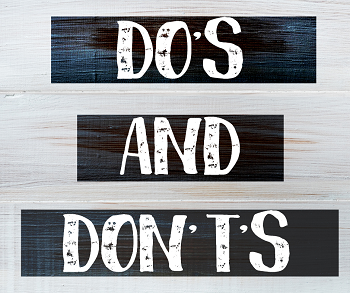If you have a loved one with bipolar disorder, you probably already know how important family support is for their recovery. However, it can be tough to be supportive because the symptoms of bipolar disorder can affect you, as well.
Bipolar disorder is characterized by manic episodes that may alternate with periods of depression. During manic periods, your loved one may have explosive outbursts, reckless behavior, or psychotic thoughts. They may make poor decisions that affect you or make outrageous demands on your time.
When a person with bipolar disorder is depressed, they may have a hard time taking care of their basic needs. Things like getting out of bed and showering may be difficult for them. These behaviors and issues affect — not only the person with bipolar but those closest to them too.
The good news is that people with bipolar disorder can get better with the proper treatment and support from loved ones. Here are a few pointers on the do’s and don’ts of helping someone with bipolar.
Dont’s
● Ignore threats of suicide – Up to 50 percent of people diagnosed with bipolar disorder will attempt suicide at least once. Even if you don’t believe that your loved one would commit suicide, it is essential to take any threats of suicide seriously. Anytime someone talks about suicide; it is a crisis requiring immediate attention. The person needs to be evaluated by a mental health professional to determine if they need hospitalization. You can contact the National Suicide Prevention Lifeline anytime day or night if you are worried about a loved one.
● Expect the person to control manic behavior – Manic episodes require treatment. A person cannot manage these episodes with sheer willpower. Mania should not be taken lightly. Your loved one may need to go to the hospital if the episode is severe.
Do’s
● Learn as much about bipolar disorder as possible – The more you know about the disorder, the better you can help your loved one. Read books, articles and blog posts about the disorder. This will also help you understand what they are going through. Talk to your loved one’s therapist about ways that you can help them.
● Be involved in their treatment – Encourage your loved one to take medication and keep their doctor’s appointments. If it is your spouse or significant other who has bipolar disorder, attend couples counseling with them.
● Take care of yourself – Your loved one’s behavior can have a significant effect on you. It is crucial for you to take care of yourself also. Maybe consider getting therapy yourself or join a support group.
● Reach out for help in a crisis – If you believe that your loved one may be a danger to themselves or others, seek help immediately. Signs of an emergency include threats to harm self or others, hearing or seeing things that are not there and not sleeping or eating for several days.
You can help someone with bipolar disorder by encouraging them to stick with treatment and being patient and understanding. Let them know that you are on their side and don’t forget to take care of yourself also. For more information about Sacramento couples therapy, contact us today.
Nancy Ryan, LMFT
Nancy Ryan, LMFT specializes in working with individuals and couples who want deep, satisfying relationships with themselves and their partners. She works with couples who are ready to stop the destructive patterns and want to build the love, friendship and romance back into their partnership.
Please call for a free consultation 916-426-2757 or click here to book an appointment online.


